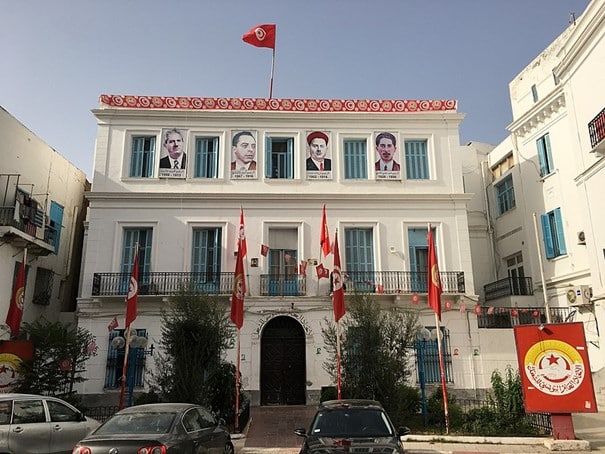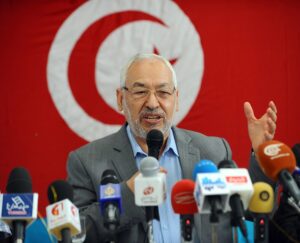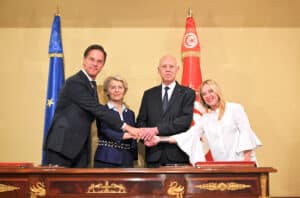Office of the UGTT in Tunis (source: Wikimedia Commons)
Tunisia’s powerful labour union, the Tunisian General Labour Union (UGTT) has rejected President Kais Saied’s democratic backsliding. In a speech on Saturday, Noureddine Taboubi, leader of the UGTT, said: “We no longer accept the current path because of its ambiguity and individual rule, and the unpleasant surprises it hides for the fate of the country and democracy.”
“Defend rights and freedoms whatever the cost”
The UGTT has played a significant role in Tunisian politics over the years. After the Jasmine Revolution of 2010/2011, the UGTT, together with other civil society partners, initiated a national dialogue to find a way forward for Tunisia’s political future. The labour union has more than one million members.
In his speech on Saturday, the leader of the UGTT added that “we will not hesitate to defend rights and freedoms whatever the cost.” Although the UGTT has questioned the president’s slow power grab before, it has generally avoided opposing Saied’s agenda. In the past, the UGTT has successfully shut down the economy, by organizing strikes that affected air traffic, public transport, and public administration.
Support Saied
Saied, a former professor of constitutional law, won the presidential elections of 2019 as an independent candidate, presenting himself as an outsider from the Tunisian political establishment. His victory primarily relied on the votes of young Tunisians, who felt disillusioned with politics and suffered from high unemployment rates.
Saied implemented emergency measures and suspended parliament on July 25, 2021, following months of protests. Demonstrators demanded solutions for the high unemployment rates, the corona crisis, police brutality, and corruption. Since, Saied has solidified his one-man-rule, by officially dissolving parliament, seizing control of the electoral commission, and enshrining his powers through a constitutional referendum.
Initially, Saied’s move received widespread support from the Tunisian population, with polls measuring around 87% approval rates for Saied’s actions. Critics have accused the Tunisian President of democratic backsliding and carrying out a coup.
“The only Arab democracy”
Saied’s power grab came as a surprise to many. After the Arab Spring of 2010/2011, in which protesters around the Arab World had taken to the streets to demand social justice and political freedom, Tunisia was the only country to establish a successful democratic system. Western observers and policymakers hailed Tunisia as a success story, dubbing it “the only Arab democracy”. But they overlooked the growing political disillusionment among many Tunisians, who had become increasingly disenchanted with the country’s widespread corruption and worsening economic conditions.
Parliamentary elections are scheduled later this year, on December 17. Most political parties have announced that they will boycott the elections, arguing that the process will not be impartial since Saied has taken over control of the electoral commission. In addition, the president has implemented other electoral changes, such as cutting funding for campaigns and bringing down the number of seats in the House of Representatives. In the meantime, Tunisia’s political crisis is deepening, and its economic crisis worsening.
Sources: Al Jazeera, Middle East Monitor1, Middle East Monitor2
Photo: Wikimedia Commons



